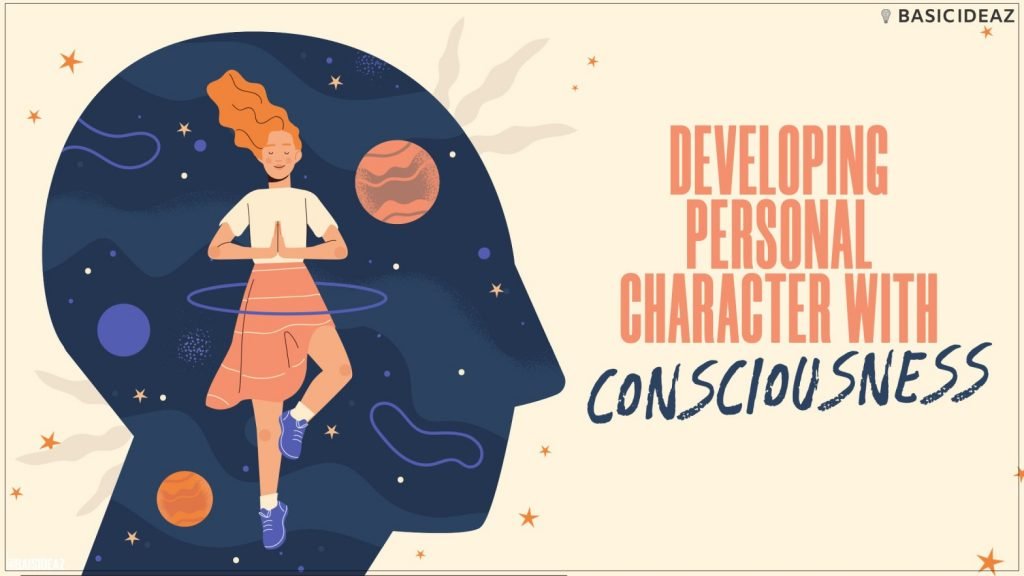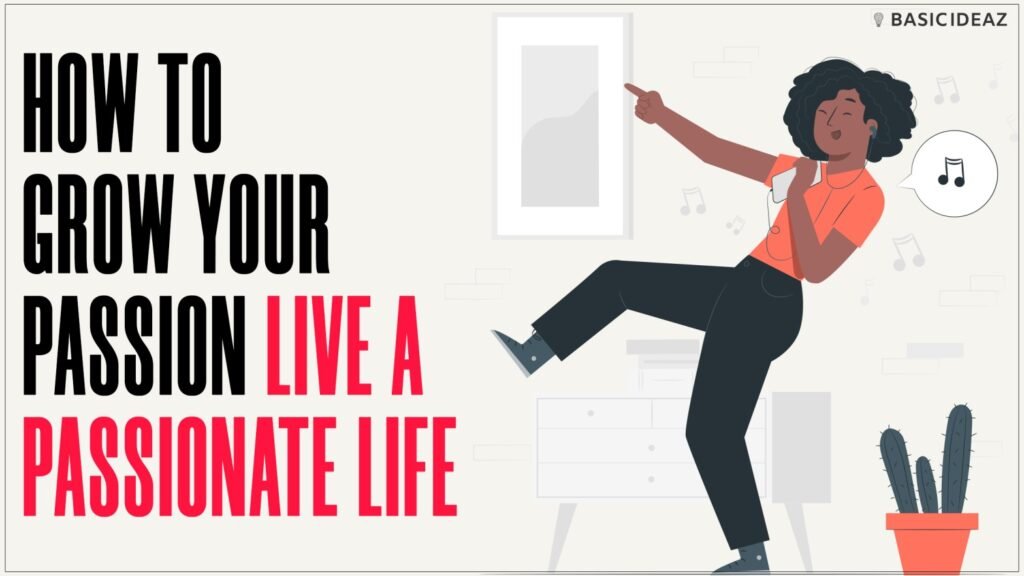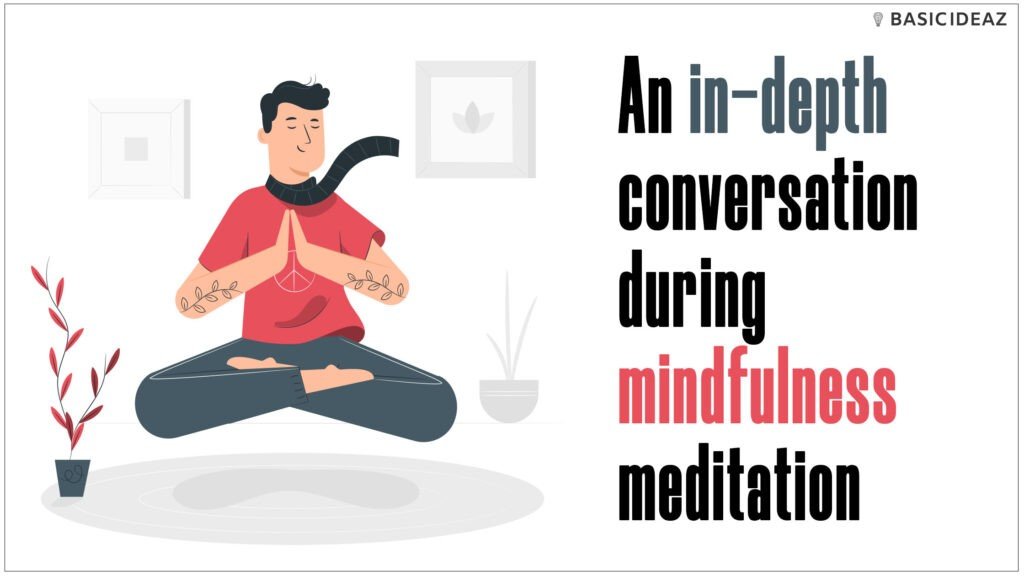The Art of Developing any Skill | Rapid Growth
What is the science behind developing any skills?
Why does it take such a long time to develop hard skills?
How to develop any skill rapidly?
Can skills surpass talent?
Can I become anything I want, irrelevant of my age and IQ?
We will discuss the above topics and the correct way to practice to grow rapidly in any skill we want to develop.
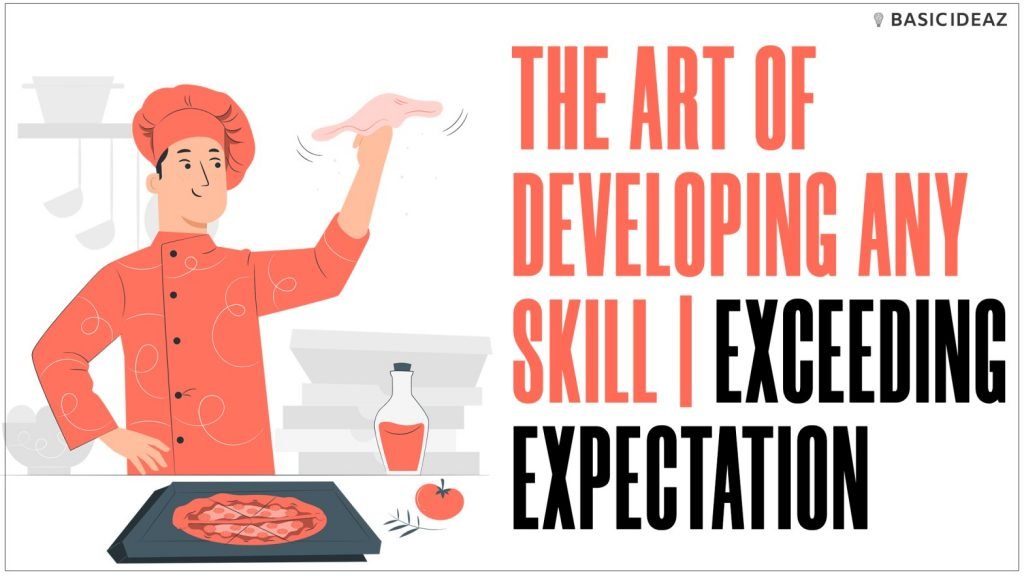
Get Quality Self Improvement Articles Every Week, No Spam, No Ads.
Thank you!
You are added to the community of Basicideaz.
The Art of Practice.
Roy practices his guitar everyday.
He loves playing the guitar when he can sing along with it.
But, after three months of practice, he can play only one song.
So, when I asked, why don’t you learn a new song?
He said, “I don’t know bar chords, and news songs are difficult to play. I make a lot of mistakes.”
I replied, the more mistakes you make, the more you will learn.
Right? Is this statement even true? I asked myself.
Why does making mistakes teach us more than effortless practice??
What goes in the brain when we put a targeted effort rather than mindless practice?
After this, I started researching the topic of the art of practice, ‘How to develop skills fast that can surpass natural talent.;
I learned that when we practice in a focused way, to learn a specific thing, push ourselves to the edge of our abilities, make mistakes, and rather than getting angry, we take it as an opportunity to learn more, we grow rapidly.
In other words, practice, where our pace slows down, where we need to struggle more to advance even a few inches in our domains, where headache and frustration are inevitable, is where the real magic happens.
When we make mistakes while practicing, we get angry at ourselves as if we know it already.
The next time you make mistakes, stop for a moment and think about it.
But, pushing ourselves to the edge of our abilities will require huge effort and energy.
It is this energy and effort that stops us from developing any skill.
The latter article will explore how we can put energy and effort into pursuing our goals.
Talent vs Skills.
Talent is something we are born with -natural abilities that are better than average human beings.
Skill is something we develop through practice and hard work.
It is easy for us to label someone as ‘natural or talented’ once we saw them performing effortlessly.
We also use the term ‘God gifted.’
If talent is all we care about, why does the hard worker in the class always come first?
Why does the resilient, determined, and focused always win at the end rather than the natural?
Why do people call it ‘he/she is talented’ when someone achieves excellence after putting in all his effort for a decade or two?
Talent is too overrated.
We have seen repeatedly in our daily lives that the person who practices the most always surpasses the natural.
The natural depends on automatic growth and hopes for effortless performance.
But, the person who focuses on self-improvement depends on deliberate growth.
Because, in today’s competitive world, you can’t achieve greatness without pushing your limits and without practicing on the edge of your abilities.
We are all good at something; if not, develop it.
Because the brain can learn faster than we can imagine.
But, once we start living consciously, pushing our boundaries deliberately, things will become even more difficult.
The road to greatness is not strewn with petals and leaves; instead, it is filled with self-doubts, distraction, stress, frustration, pain, and brain fog.
But, there is joy in walking the path of greatness.
This joy is what keeps us pushing.
Again, there are a lot of hard workers out there. A lot of us practice everyday, and only a few make it in the end.
Because it is not only about the length of practice but also how we practice in developing any skills.
Get Quality Self Improvement Articles Every Week, No Spam, No Ads.
Thank you!
You are added to the community of Basicideaz.
The neuroscience behind our skills development.
Our brain is constantly changing since the day we come into existence.
Not so long ago, people used to believe that our brain is fixed like a computer.
It receives the input, and if we have the capacity, we process it and provide the output.
We used to believe that skills and talents are innate and there is nothing to improve them.
Either we have it, or we don’t.
But, after the recent discoveries in neuroscience, the old beliefs shattered.
Neuroplasticity suggests that our brain is constantly changing throughout our lifetime.
For every activity, every action, our brain forms new neural pathways or strengthens the older pathways to make our lives better.
To communicate with someone, there are circuits- made of neural pathways in our brain.
Similarly to run, talk, painting, writing, singing, swimming, etc., we have circuits in our brains.
Again, the stronger and bigger the circuits are, the better we are at that skill.
The opposite is also true.
Once a strong circuit shrinks or becomes dormant, our effectiveness also goes down in that skill.
But, the interesting question is, how to strengthen those circuits or neural pathways, and why some circuits become dormant or shrink?
The answer is repetition.
The more you repeat a certain activity, your neural pathways for that activity will keep getting stronger, and once you stop repeating the activity, your neural pathways will shrink.
Why does repetition make our neural pathways stronger and improves our skills?
For every movement, thought, or action, there are neural circuits in our brain. The neurons are connected with each other, which forms a web-like structure in our brain.
To perform an activity, we send electrical signals or impulses through these neural pathways.
The impulses are so rapid that the activity happens pretty quickly.
For example, you want to drink a glass of water.
For that, you have to stand up, go to the kitchen, take out the bottle from the refrigerator, and drink.
It happens very rapidly.
You don’t need to sit for a minute and think that you need to stand up first to meet your goal. It happens in an instant.
The electrical impulse works that way.
But, if electrical impulses are so quick, then why we need thousand of hours of practice to master guitar or football.
Because only neurons are not enough to hone our skills.
Myelin is the key to acquiring skills.
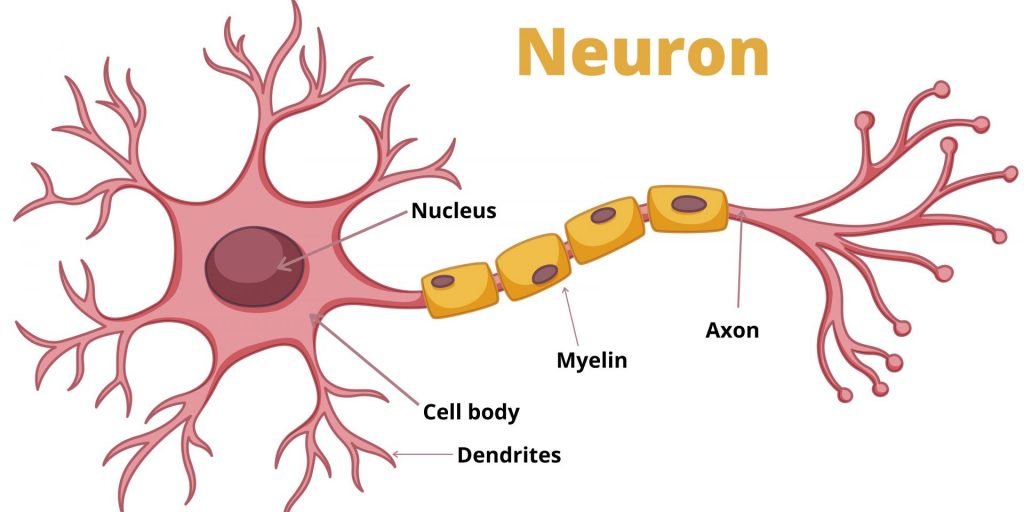
Myelin is the yellow insulation that is shown in the above image.
What does myelin do?
Let’s put it this way, the more myelin your circuits will have, or in other words, the bigger the insulation, the better your skills will be in that circuit-related activity.
How to wrap more myelin in our circuits?
The more we fire a particular circuit, the more myelin will get wrapped in that circuit.
Myelin helps in increasing electrical signal strength, speed, and accuracy.
Daniel Coyle, the author of The talent code, put this information in three key points:
- Every human movement, thought, or feeling is a precisely time electrical signal traveling through a chain of neurons- a circuit of neural pathways.
- Myelin is the insulation that wraps these neural pathways and strengthens their signal speed, accuracy, and strength.
- The more we fire a particular circuit, the more myelin accumulates, and our skills get improved.
Imagine it this way.
Myelinated pathways are the superhighways, and non-myelinated pathways are gravel roads with potholes.
Everybody is skilled at something.
You are skilled at speaking your native language. If English is your native language, you have bigger insulation in your English language circuit, which helps you in your fluency.
If you are skilled at playing video games, you have accumulated more myelin in your gaming circuit. It is that simple.
But, wrapping myelin is not easy.
It is time-consuming and takes immense energy.
How to fire neurons that optimize more myelin in our circuit?
The exciting thing about circuits is that, once a circuit is familiar with its activity, we don’t think about the activity anymore while performing the task.
The circuit of brushing your teeth in the morning happens on its own. You don’t need to think about which side you need to brush or how your brush movements should.
You have already perfected your brush movements throughout practice in your lifetime.
You don’t pay attention anymore.
In other words, we don’t struggle once a circuit is wrapped with myelin.
The opposite is also true; when we are new to an activity, we struggle to perform that activity.
Learning how to drive in the beginning takes a lot of focus and Struggle.
The more we struggle everyday, the more we become better at driving.
Once we become better at driving, or once we wrap our driving circuit with myelin, the Struggle is over. We don’t focus on it anymore.
So, put it this way, struggling is the biological need for wrapping myelin in our circuits. The more you struggle, the more you will wrap myelin.
Again, Struggle demands a great deal of our focus.
Without focus, we cannot perform an activity that is beyond our abilities.
Higher Struggle = Higher Focus
But, when we struggle the most?
We struggle the most when we perform an activity beyond our capacity.
When we perform an activity that is beyond our capacity, we make the most mistakes.
This is where focus comes into play.
We stop, analyze the mistake, repeat to perform it again with high intensity until we correct it.
Once we correct it, we move to our next mistake.
This is how we built optimized myelin-wrapped circuits.
Practicing the same song everyday doesn’t improve our skills in guitar.
Practicing the songs which are complex and beyond our capacities do.
To develop any skill, we need to focus on the part where we make more mistakes. The part where we make more mistakes is the hardest of all.
The secret to developing any skills rapidly is that, once we become good at the hardest, the others part of the training related to that skill becomes easier.
Repetition is the mother of all skills.
Mindless repetition does improve your skill at a very slow rate, but conscious, effortful, focused, and targetted repetition is where the magic happens.
How to do focused practice everyday to develop any skill rapidly?
You can do a six-month worth of practice in one week if you go with the focused practice.
Focused practice demands higher mental and physical energy.
Most of the people who do focused practice burn out their brains after 3-5 hours.
In his book, K. Anders Ericsson, the author of Peak, mentioned that, after researching various students on deliberate practice/ focused practice, he has found that students can at most be productive for 5 hours maximum.
Five hours of focused practice results in world-class performers.
But, 1-3 hours of focused practice is the average for most.
Everyone is not becoming a world-class performer. That’s rare.
To practice 1-5 hours everyday is a huge requirement for us.
We may not feel the requirement now because we are pumped up and motivated after reading this article.
We may even think to practice 6-10 hours a day because we feel like we can.
Maybe we can, but not for very long.
Motivation is the fuel to our productivity.
But, fuel burns, and it is limited.
Once the motivation is over, our repetition is over.
Forget about practicing, 1-5 hours; we may not feel like practicing for a minute.
But, there are people who practice everyday.
The exceptional who will go to the gym, practice their piano lessons, write every morning, keep pushing every day despite the odds, despite the emotional turbulence, despite the bad news, and despite boredom.
How do they do it? What is the secret to their motivation?
Get Quality Self Improvement Articles Every Week, No Spam, No Ads.
Thank you!
You are added to the community of Basicideaz.
Two Types of Motivation
Extrinsic or external motivation comes from external sources. Fame, money, life partner are the external source of motivation.
In simple words, you perform an action for an external cause.
The cause can be positive or negative.
If you don’t finish the work by today, you will be fired. This is an external negative motivation.
Extrinsic motivation is powerful and supplies you with a burst of energy to achieve your goals.
Extrinsic motivation is best for starting your journey in your career, but the worst is to rely on it for a long time.
Because extrinsic motivation never lasts. It is short-term, and it fades away after some time.
Intrinsic or internal motivation comes from within us, from our values, passion, and morality.
There are days when you don’t feel like working. But, once you start, you feel good about yourself and keep going more than your expectations.
This internal feeling of good is intrinsic motivation.
To focused practice everyday, we need to rely on intrinsic motivation.
How to activate intrinsic motivation everyday is the focus of this article.
Three sources of Motivation/Energy
1. Passion/ Love
We always have energy for the person or thing that we love. If you don’t feel like waking up from bed, let your crush call you and ask you to meet in five minutes.
What will you do? We all know the answer.
People who are passionate about their work rarely miss a day practicing.
But, this level of passion doesn’t come to everyone in an instant.
For some, it is instant. Once they experience something, they know what they want to do in their life.
This is extremely rare.
Most of us build our passion by working on it, nurturing it, and repeating it.
The more you repeat your interest with intense focus, the more you will love your work.
Passion grows from a tiny flame within us—an interest in an activity or a small motivation to do something.
The tiny flame slowly converts into a raging inferno if we guide ourselves in the right direction.
If you want to know more about growing passion, you can follow the link below:
How to Grow Your Passion | Live a Passionate Life
But, no matter what you do, you need to repeat the activity over and over again with an intense focus to build your passion.
But how to repeat the activity if the energy or motivation is not there.
We can find energy or motivation from two other sources as well.
2. Pain
Heartbreak, death of a loved one, illness, rejection, loneliness are the source of energy.
Though pain is extrinsic motivation and doesn’t last long, bigger and deep pain lives in our unconscious mind forever.
It takes out of our comfort zone, creates awareness in our lives, and tells us to do something to improve our lives.
Some of us waste this huge energy source on short-term gratification like drinking, smoking, or watching pornography.
Others successfully channel this energy source into their productive work and create things beyond their expectations.
You can take out the history of most of the successful people; either they have suffered massive pain in their lives, or either they were passionate about something for a long time.
Though pain and love seem to be the most common source of energy, there is one more source that can completely change a person’s life within a year or two.
3. Sexual Energy
The energy in your semen can create new life. There is a popular movement going on the internet about Nofap.
It is about stopping watching porn and masturbation for a certain period of time.
Watching porn is an addiction, and once you quit an addiction, you automatically become productive.
But, the key to nofap is semen retention.
The benefits of semen retention or nofap can shock you.
But, Nofap is not a challenge; it is a lifestyle, away from high stimulation. This can help your mental growth along with your productivity.
Once a person can channel his sexual energy into his works, his productivity skyrockets.
Unfortunately, this is a relatively new topic, and most self-help books have not talked about it.
Though it is practiced in Indian culture for thousands of years and there are many naysayers about the practice of nofap.
They don’t believe in it, as if watching pornography and masturbation has improved their life.
I don’t judge them. It is their opinion.
But, if you want to know the truth about something, you have to see it yourself.
Try it for 21 days and see if anything happens.
How to activate intrinsic motivation everyday
Intrinsic motivation can be activated through Small Practice.
As the name suggests, small practice is practicing small.
Research shows that intrinsic motivation gets activated only through actions.
It is not activated by thoughts, stress, deadlines, or anything.
The ‘feeling good’ of working can only be activated through actions.
Based on this principle, we need to keep our daily goals small.
It should be so small that we don’t need the motivation to do it.
A small amount of willpower will do the job.
To do two pushups daily will not demand a huge motivation and or willpower, again reading three pages everyday of your book is easy.
Once you meet your daily goals, you will feel a small burst of energy within you.
This small burst of energy will help you to continue your practice.
This is intrinsic motivation.
Keep in mind that you don’t need to focus on the bonus practice; your only goal is two pushups.
After meeting the daily goals, if you still don’t feel like doing it, at least you did two pushups and keep the daily chain of practice alive.
Small practice is a vast topic which I explained in detail in the below article.
Form Productive Habits that Stick Permanently | Small Practices
Once you start following small practice everyday, you start your journey forming lasting habits for success.
Conclusion
Struggle is the basic requirement in developing any skill. The moment you slow down, feel the pain or frustration while learning something is the moment of growth.
We assume that practice should be effortless, just like the athletes we watch in Olympics.
But, that is performance, not practice.
If you want to see them practice, visit their training centers, and you will notice the focus, attention, and struggle they put in everyday to improve their performance.
They work on the edge of their ability, where the magic happens.
Best
Ahbab

